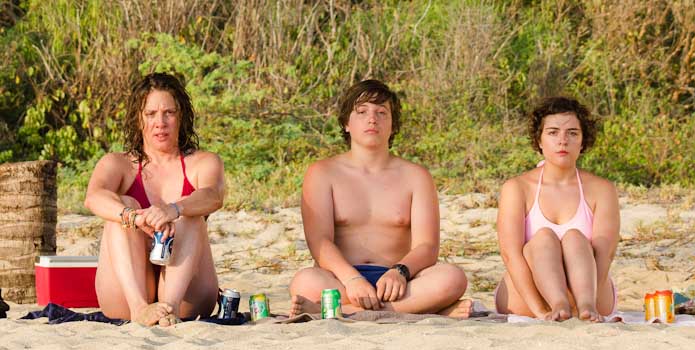
 Nobody does films about teenage life like Fernando Eimbcke. In just three films he’s perfected the coming-of-age story in ways no Hollywood movie has come close to in decades. His sparse, intimate looks at the lives of teenagers are often so real you have the desire to look away as they remind you of things that might’ve happened to you during those years. In “Club Sandwich” he takes us to a practically empty beach resort where Paloma (María Renée Prudencio) and her son Héctor (Lucio Giménez Cacho) spend a few days. “It was a promotion” explains the young man when asked why they came during low season.
Nobody does films about teenage life like Fernando Eimbcke. In just three films he’s perfected the coming-of-age story in ways no Hollywood movie has come close to in decades. His sparse, intimate looks at the lives of teenagers are often so real you have the desire to look away as they remind you of things that might’ve happened to you during those years. In “Club Sandwich” he takes us to a practically empty beach resort where Paloma (María Renée Prudencio) and her son Héctor (Lucio Giménez Cacho) spend a few days. “It was a promotion” explains the young man when asked why they came during low season.
At the beginning of the film we see Paloma and Héctor do everything together; they put lotion on each other’s backs, listen to music together under the burning sun (in an endearing moment he asks his mother if he’s as sexy as Prince, “you’re sexy in your way” she replies) and munch on the title culinary creation, he with a chocolate milkshake, mom with cold beer. Héctor’s father isn’t mentioned and it doesn’t take us long to figure out that Paloma is a single mother who has dedicated her entire life to her son but as she tries to cling on to the last she has of his childhood, she fails to realize that he’s already drifting away.
He wakes up after involuntary nocturnal emissions and washes his underwear so that mom won’t discover him, he begins to realize his armpits are releasing an unpleasant smell and uses his mom’s deodorant when she’s not around, he also sees a tiny mustache begin to form above his lip, much to his disdain. If things weren’t complicated enough new guests arrive one of them being Jazmín (Dánae Reynaud) a mature sixteen year old who grabs his eye.
There is a beautiful symmetry in “Club Sandwich” as we see Héctor go from mama’s boy, to Jazmín’s object of desire. Each of the performances in the film feels so lived in that we can’t help but wonder where the acting started and the being stopped. Prudencio is heartbreaking while being hilarious and Reynaud has the kind of screen presence that overtakes you and grabs your attention from the start.
Eimbcke fills the film with humorous moments, made the funnier because they’re blink-and-you’ll-miss-them in their nature (very much like real life). During one hilarious scene Paloma watches a show on TV about female lions taking care of their cubs, once Héctor gets the remote he’s caught by a show that explains the importance of males in early Mexican culture. The film reveals a sly transfer of powers that turn it from a simple comedy into a raw portrait of growing up and learning that we are the more mature, the more we know how not to break the hearts of those who love us.